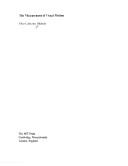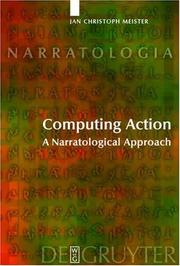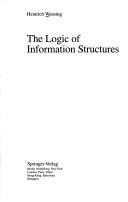| Listing 1 - 4 of 4 |
Sort by
|

ISBN: 0262081431 9780262081436 Year: 1984 Publisher: Cambridge (Mass.): MIT press
Abstract | Keywords | Export | Availability | Bookmark
 Loading...
Loading...Choose an application
- Reference Manager
- EndNote
- RefWorks (Direct export to RefWorks)
Digital computer simulation --- Motion perception (Vision) --- -#TELE:d.d. Prof. A. J. J. Oosterlinck --- Movement perception (Vision) --- Speed perception --- Movement, Psychology of --- Vision --- Visual perception --- Digital simulation --- Computer simulation --- Data processing --- Digital computer simulation. --- Data processing. --- #TELE:d.d. Prof. A. J. J. Oosterlinck
Multi
ISBN: 9172227028 Year: 1984 Publisher: Stockholm Almquist and Wiksell
Abstract | Keywords | Export | Availability | Bookmark
 Loading...
Loading...Choose an application
- Reference Manager
- EndNote
- RefWorks (Direct export to RefWorks)
Audiometry, Speech --- Hearing Disorders --- Computers. --- Speech Discrimination Tests --- Calculators, Programmable --- Computer Hardware --- Computers, Digital --- Hardware, Computer --- Calculator, Programmable --- Computer --- Computer, Digital --- Digital Computer --- Digital Computers --- Programmable Calculator --- Programmable Calculators --- methods. --- diagnosis. --- Theses --- Physiology of nerves and sense organs --- Computers --- methods --- diagnosis

ISBN: 3110176289 9786612195501 1282195506 3110201798 9783110201796 9783110176285 Year: 2008 Publisher: Berlin Boston
Abstract | Keywords | Export | Availability | Bookmark
 Loading...
Loading...Choose an application
- Reference Manager
- EndNote
- RefWorks (Direct export to RefWorks)
Der theoretische Schwerpunkt der Arbeit liegt auf der Episode als der kleinsten geschlossenen Einheit erzählter Handlung. Die Episode wird definiert als ein Interpretationskonstrukt des Lesers, der eine Reihe distinkter Sachverhalte in der fiktionalen Welt als eine transformationelle Serie aus genau zwei Ereignissen konstruiert. Dieser Vorgang hat den konkreten Text zur Basis; er bezieht jedoch darüber hinaus sowohl das Weltwissen des Lesers ein und verläuft in Abhängigkeit von bestimmten logischen und semiotischen Regeln, die den Status von De-facto-Universalien des Lesens von Handlung besitzen. Neben der Formulierung neuer Definitionen für die Kernbegriffe Ereignis, Episode und Handlung stellt die Arbeit in einem computerphilologischen Teil eine neu entwickelte Softwareanwendung vor, die als Werkzeug zur Identifizierung, Auszeichnung und Analyse von Ereignissen im narrativen Text dienen kann. “Computing Action” takes a new approach to the phenomenon of narrated action in literary texts. It begins with a survey of philosophical approaches to the concept of action, ranging from analytical to transcendental and finally constructivist definitions. This leads to the formulation of a new model of action, in which the core definitions developed in traditional structuralist narratology and Greimassian semiotics are reconceptualised in the light of constructivist theories. In the second part of the study, the combinatory model of action proposed is put into practice in the context of a computer-aided investigation of the action constructs logically implied by narrative texts. Two specialised literary computing tools were developed for the purposes of this investigation of textual data: EVENTPARSER, an interactive tool for parsing events in literary texts, and EPITEST, a tool for subjecting the mark-up files thus produced to a combinatory analysis of the episode and action constructs they contain. The third part of the book presents a case study of Goethe's “Unterhaltungen deutscher Ausgewanderten”. Here, the practical application of theory and methodology eventually leads to a new interpretation of Goethe's famous Novellenzyklus as a systematic experiment in the narrative construction of action - an experiment intended to demonstrate not only Goethe's aesthetic principles, but also, and more fundamentally, his epistemological convictions.
82:800 --- 82:1 --- 82-3 --- Literatuur en taal --- Literatuur en filosofie --- Proza. Fictie. Narratologie --- Artificial intelligence. --- Narration (Rhetoric). --- Artificial intelligence --- Narration (Rhetoric) --- Engineering & Applied Sciences --- Computer Science --- 82-3 Proza. Fictie. Narratologie --- 82:1 Literatuur en filosofie --- 82:800 Literatuur en taal --- Narrative (Rhetoric) --- Narrative writing --- AI (Artificial intelligence) --- Artificial thinking --- Electronic brains --- Intellectronics --- Intelligence, Artificial --- Intelligent machines --- Machine intelligence --- Thinking, Artificial --- Rhetoric --- Discourse analysis, Narrative --- Narratees (Rhetoric) --- Bionics --- Cognitive science --- Digital computer simulation --- Electronic data processing --- Logic machines --- Machine theory --- Self-organizing systems --- Simulation methods --- Fifth generation computers --- Neural computers --- E-books --- 82-3 Fiction. Prose narrative --- Fiction. Prose narrative

ISBN: 3540567348 0387567348 3540476423 9783540567349 Year: 1993 Volume: vol 681 *35 Publisher: Berlin Springer
Abstract | Keywords | Export | Availability | Bookmark
 Loading...
Loading...Choose an application
- Reference Manager
- EndNote
- RefWorks (Direct export to RefWorks)
This monograph gives a logical treatment of two central aspects of the concept of information, namely information processing and information structure. The structure of information is treated as a topic in model theory, while information processing is seen as an aspect of proof theory. A wide spectrum of substructural subsystems of intuitionistic propositional logic and of Nelson's constructive logic with strong negation is investigated. In particular, the problems of cut-elimination, functional completeness, and coding of proofs with lambda-terms are handled. Finally, an interpretation of these systems in terms of states of information and operations over these states is presented.
Artificial intelligence. Robotics. Simulation. Graphics --- Information systems --- AI(Artificial intelligence) --- Artificial intelligence --- Artificial thinking --- Artificiële intelligentie --- Computer science --- Electronic brains --- Informatica --- Informatique --- Intellectronics --- Intelligence [Artificial ] --- Intelligence artificielle --- Intelligent machines --- Kunstmatige intelligentie --- Logic [Symbolic and mathematical ] --- Logica [Symbolische en wiskundige ] --- Logique symbolique et mathémathique --- Machine intelligence --- Thinking [Artificial ] --- Cerveaux électroniques --- Machines intelligentes --- Pensée artificielle --- Artificial intelligence. --- Logic, Symbolic and mathematical. --- Artificial Intelligence. --- Mathematical Logic and Foundations. --- Algebra of logic --- Logic, Universal --- Mathematical logic --- Symbolic and mathematical logic --- Symbolic logic --- Mathematics --- Algebra, Abstract --- Metamathematics --- Set theory --- Syllogism --- AI (Artificial intelligence) --- Intelligence, Artificial --- Thinking, Artificial --- Bionics --- Cognitive science --- Digital computer simulation --- Electronic data processing --- Logic machines --- Machine theory --- Self-organizing systems --- Simulation methods --- Fifth generation computers --- Neural computers
| Listing 1 - 4 of 4 |
Sort by
|

 Search
Search Feedback
Feedback About UniCat
About UniCat  Help
Help News
News